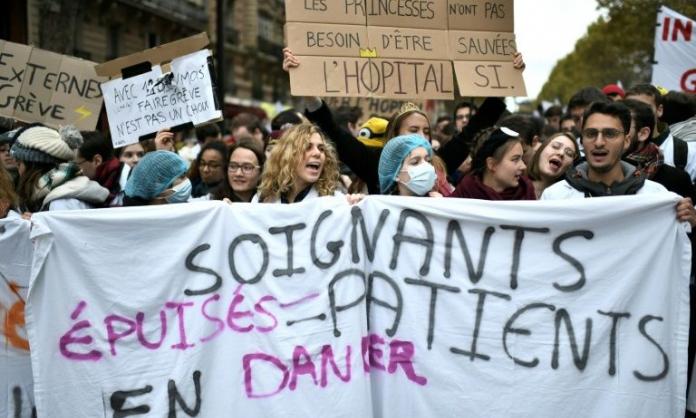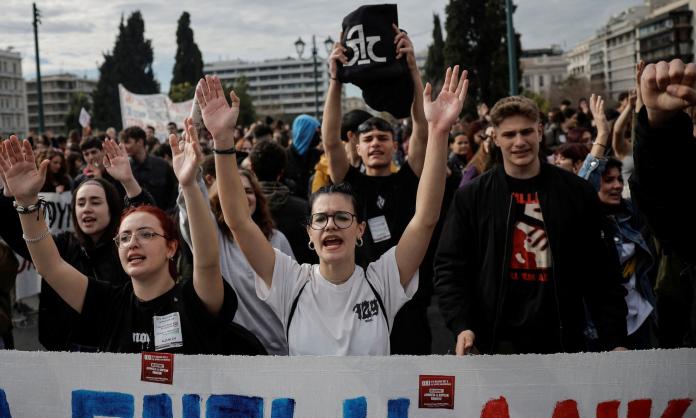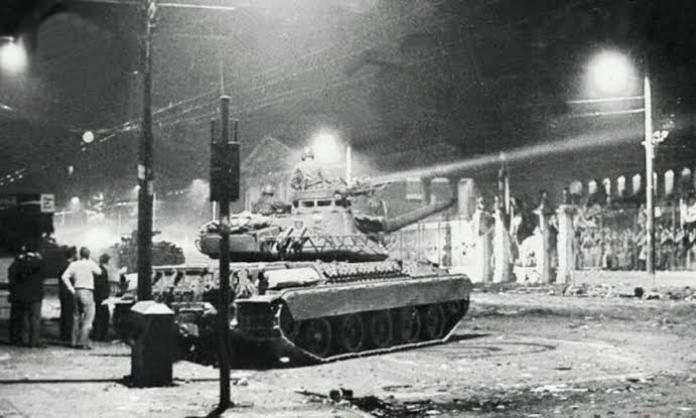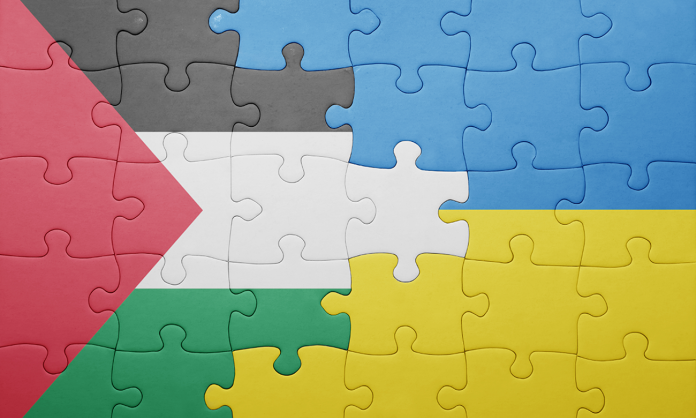Lucien Sève succumbed to the coronavirus in late March, but you could say that he was killed by France’s under-resourced health system. Deprived of a ventilator, the Marxist philosopher was left to die at the Béclère hospital in Clamart, Paris, deemed “not a priority” because his body was 93 years old. Sève spent decades fighting against the degradation of the health care system. In his view, the human body is not simply a natural biological entity. It is the place in which the dignity of a person takes shape amid the practices of a society – so a person’s worth is bound up with how society takes care of their body.
The French health care system deemed Sève unworthy, practically and institutionally robbing his life of dignity, illustrating that human beings are treated simply as means to profitable ends in the general dehumanisation in president Emmanuel Macron’s France, where the hospitals are overwhelmed.
All the warning signs were there. Last December, before anyone knew about the coming coronavirus, underpaid hospital workers were on the streets with banners reading: “The state will count its cash; we’ll count the dead”. Right now, more than 500 people are dying per day in the pandemic’s early stages. The north-east of the country, and the north-central region, where Paris is located, are being ravaged.
The practice of patient “sorting” is already under way, as Lucien Sève’s case shows. It is becoming clear that nobody over 70 will receive the care they need in overloaded hospitals. The French use the verb trier to denote this sorting process. It’s versatile enough to apply to waste and human beings alike. Dostoevsky wrote that a society’s level of civilisation can be judged by walking into its prisons. Today we can judge our society by the way it sorts its human waste – in hospitals, in nursing homes and in poorer working-class neighbourhoods. Yet despite the death rate from the virus being low among young people, 35 percent of intensive care patients are under 60. The youngest death was a 16 year old.
Health workers are demanding more protections and more human and material resources to cope with the crisis, but Macron has turned a blind eye. The situation is a disaster: masks, gloves, hand sanitiser and testing kits are not available to carers and workers in general.
The lack of protective equipment has led to the deaths of doctors, nurses and carers. Women are on the frontlines of the fight against the pandemic: they make up 88 percent of the nurses, 90 percent of the cashiers, 82 percent of the primary school teachers and 90 percent of the nursing home workers. Without protective gel, masks, gloves and social distancing measures, women on the front lines will disproportionately suffer. Many of these women will been workplace leaders, like Aïcha, the General Confederation of Labour delegate at Carrefour Saint-Denis Basilique (a supermarket triple the size of the average Coles), who died last Friday.
The French government undermined the fight against COVID-19 from the beginning. Macron’s widely publicised visit to the theatre in early March, to “encourage the French to venture outside despite the coronavirus”, symbolised the disregard, as did the decision to push ahead with municipal elections on 15 March despite the closure of non-essential retail. As Marina Garrisi, an editorial committee member of the Révolution Permanente website, explained early this week from Paris, the authorities were criminally negligent: “The French government refused to test patients even when all the symptoms were present (headaches, fever, cough, wheezing, etc.) because there weren’t enough tests and “it costs too much”(!). The other consequence of this strategy of ‘minimalist testing’ is that it is impossible to know exactly how many people in France are really infected”.
Many believe Macron is responsible for the situation. After an initial bump in popularity as the virus hit and emergency measures were finally taken, his support has fallen again. A national poll taken one week after confinement measures were announced found that 71 percent of respondents think the government didn’t act fast enough, and 61 percent believe that the government has not delivered enough health infrastructure and personnel to fight the virus.
Meanwhile, Macron is using the health crisis to smash up the historic labour code, legislate by degree, enact a state of emergency to circumvent parliamentary debate and is allowing employers in power, telecommunications, transport and logistics and farming to impose a 60-hour work week with only nine hours of rest between shifts. This is shock doctrine stuff – the scale of it is staggering. According to Gerard Filoche, a well-known labour inspector, the 60-hour week takes labour legislation back to 1841.
**********
The north-central region has the best equipped hospitals in the country. Yet the Seine-Saint-Denis, north-east of Paris, is overwhelmed with COVID-19 patients. Known locally as quatre-vingt treize, Seine-Saint-Denis is working class and multiracial, with a population of 1.8 million. Already lacking beds, doctors and resources, the area gives a glimpse of the horrors that may come.
Hospitals such as Aulnay-Sou-Bois were understaffed and in a difficult position before the coronavirus. It has now reached its limit. “Many nurses and health assistants were hit by COVID-19 from the very start, because we didn’t have the protective equipment they needed”, Hélène Gros, head of infectious diseases at the hospital, told online newspaper Mediapart on 30 March: “The sickness has already paralysed teams of workers. Every day we are wondering how we’ll be able to fill the workstations. We have even had to decline opening new COVID-19 beds for this very reason.”
At the Delafontaine hospital in Saint-Denis, the first patients were welcomed three weeks ago. But nobody yet has left intensive care. “Some died, others are stagnating, very few are recovering”, Dr Laurent Lainé, from the intensive care department at the Delafontaine hospital told Mediapart last Sunday. “Those with more experience dealing with this illness speak of intensive care lasting at least three weeks.”
Every evening at 8 o’clock, confined residents across France bang on pots, chant and give their support to the health workers, and others, on the front lines. This is a rejection of the attacks on public health as much as it is support for the heroism of health workers. Public hospitals have lost tens of thousands of beds over the last two decades. Between 2003 and 2016, 64,000 beds were lost – 13 percent of the total. If neoliberal attacks degrade working conditions inside the workplaces, they also degrade the quality of life of workers who rely on public services: two-thirds of maternity wards have disappeared since 1989, and 7 percent of public hospitals closed between 2013 and 2017.
Between 1998 and 2018, the number of intensive care beds has dropped by 30 percent. With just 3.1 beds for every 1,000 inhabitants, France has fewer intensive care beds than Lithuania (5.5), the Slovak Republic (4.9), Poland (4.8), Hungary (4.3), Slovenia (4.2), the Czech Republic (4.1) and Estonia (3.5) -- all of which are less developed countries. With respect to the lack of masks, University of Paris anthropologist Alain Bertho wrote on 25 March, in a piece titled “Health crisis and political failure”:
“The shortage of masks is global. But this situation of crisis was anticipated by the state’s stock in the past. Following the crisis of H1N1 [“swine flu”] in 2009, France had 723 million FFP2 surgical masks at its disposal. What ever happened to this stock that wasn’t renewed after the expiration of the material? … On the recommendation of a report from the General Secretariat of the Defence and National Security in May 2013, the FFP2 stock was handed over to the ‘employers’ and not to the state. In a 2015 report, the Senate noted that this would lead to savings in terms of purchasing costs, stock and destruction, all the while noting the risk of a deficiency of capacity of production in the event of a crisis”.
The precarity of the health care workforce has compounded cuts to beds and the self-imposed shortage of surgical masks. France pays its nurses less than elsewhere in Europe; their pay is even behind Brazil and Argentina. Nurses worked extremely long hours before the pandemic, and now they are working more hours. This is creating a sense of powerlessness among health care workers – they do the job to save lives, and are working like mad to save lives, but often they are unable to do so. Twenty-four-hour shifts, sometimes standing the whole time, will take a toll physically and psychologically, without even beginning to address the trauma this event will produce.
Health care workers mobilised and fought last year to denounce the policies of austerity that led to this crisis. Macron responded with more austerity and more repression. The nurses and health care assistants who painted “the state will count its cash; we’ll count the dead” onto their banners were attacked by the same police who are now enforcing confinement.
The interior minister sent the riot squad in to beat up hospital workers just a few weeks before this health crisis. Emergency health care workers were already well ahead of the curve: they began striking in the emergency rooms last March. The present spike in deaths and hospitalisations marks the one-year anniversary of their struggle against pay freezes and overcrowding. The strike movement hit 203 public emergency rooms out of 478, and workplace activists set up collectives to coordinate the action outside the formal trade unions. One of their demands was to hire 10,000 new workers in the emergency rooms.
The courage, principle, experience and collective expertise of these health workers will make all the difference in coming weeks, as will the labour of others like Aïcha who will ensure people are fed. They should oversee the response, not the garbage politicians and business leaders who have botched it and will continue to do so.










